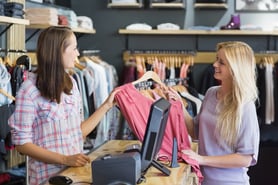 Revamping the customer experience is all the hype in 2019 and according 451 Research, optimizing the checkout is central to providing a good in-store experience. All too often, customers abandon carts because of long lines. In fact, 56 percent of consumers can recall doing this at least 1 or more times in the last six months. If you’re still not convinced that a frictionless checkout is important, consider Amazon’s 1-Click technology that is worth billions thanks to its method of capitalizing on impulse purchasing.
Revamping the customer experience is all the hype in 2019 and according 451 Research, optimizing the checkout is central to providing a good in-store experience. All too often, customers abandon carts because of long lines. In fact, 56 percent of consumers can recall doing this at least 1 or more times in the last six months. If you’re still not convinced that a frictionless checkout is important, consider Amazon’s 1-Click technology that is worth billions thanks to its method of capitalizing on impulse purchasing.
When it comes to making changes that will impact your business, it’s important that you ask yourself what’s right for you. Here are some questions to consider:
Do your customers want a more personalized experience?
Some customers need and expect more attention than others. When it comes to the in-store shopping experience, putting mobile devices in the hands of your staff enables them to give those customers more assistance. Mobile devices can be used to check remote inventory, look up prices and answer questions about product features. What’s more, they can help with long lines and lower the amount of customers abandoning their carts by checking customers out in-aisle.
Another way to make the shopping experience more personalized is to push targeted promotions and coupons to customers while they shop, whether that’s online or in-store—customers tend to surf their smartphones while they shop. If your business is truly omnichannel, customers should be able to come across a targeted coupon online and use it in-store.
Do your customers already know what they’re looking for?
Some customers know what they are looking for and don’t necessarily need a consultative experience with an employee. However, there are times when what they are looking for may not be in stock—whether that’s a specific product or just a different color/size. Self-service kiosks or employees with a mobile device can help customers to order the product they want without ever leaving the store. It is a great way to cater to older folks who aren’t as comfortable searching their mobile phones while in-store like many younger people tend to do. It also helps ensure your customers don’t look to competition when they can’t find what they’re looking for—69 percent of consumers say they will move on from a brand after a bad experience. Making sure customers leave the store satisfied, either with the product they were looking for in their hands or having ordered it online, will make sure they don’t have a bad experience.
Are your checkout lines really long?
Whether or not you’ve decided that your business could benefit from mobile POS solutions or a kiosk, you probably still have a standard checkout counter that may develop long lines, especially during busy times. The length of the transaction itself may be a contributing factor. 46 percent of consumers say that ‘checkout speed’ is the most important attribute of the in-store experience. Accepting contactless payments, including mobile wallets and contactless cards, can help speed up the transaction process. Smart payments can also be used to drive stronger customer loyalty. Value-Added Service (VAS) tools can automatically integrate your customers’ loyalty programs without the hassle of asking for a phone number to look up their account. There’s also the fact that giving customers the opportunity to pay how they want to pay increases their satisfaction overall by providing a frictionless checkout experience.
When it comes to customer experience, every business is different. What’s key is ensuring that however the customer approaches your business, their experience is consistent. We’d love to speak with you about your current pain points when it comes to the checkout and discuss your next steps toward a better customer experience. Drop us a line, we’re here to help.
Peter Charpentier is Senior Director, Product Marketing at Ingenico Group, North America










